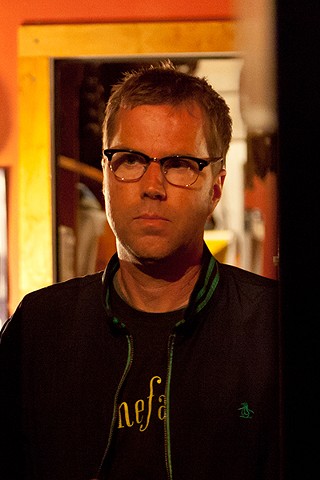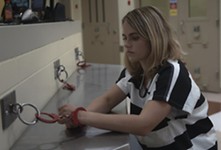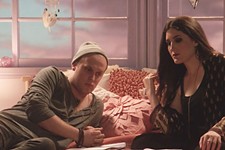Somebody Up There Likes Bob Byington
The writer-director talks about his fifth feature
By Shawn Badgley, Fri., April 5, 2013
If the release of Somebody Up There Likes Me represents a moment of reckoning in the career of Bob Byington, it appears that he is well-positioned to seize it. Despite an uneven response from critics, the Austin writer-director's fifth feature made its theatrical debut in Chicago to a resounding one from audiences, grossing the second-highest opening weekend in the past six years at the Music Box Theatre.
For most independent filmmakers, this development – a reversal of fortunes for a class of artists who on some days must wish they could sustain their work on the word counts of alternative weekly and Indiewire writers – would be a welcome one. For Byington, it's just another day at the office.
A polarizing talent whose sense of humor is so inimitable as to draw suspicion, and whose powers of observation rival those of the Sonys he shoots on, Byington is a filmmaker whom viewers – critics and audiences alike – can meet on their own terms. He imposes no expectations on how you receive his work, as long as you impose none on the work itself. In conversation, he discusses accolades and hatchet jobs with the same casual detachment.
"I want people to like the movie," he says. "But I really can't articulate why I want people to like the movie, so why should I get too torn up about it if they don't?"
Fair enough. For Byington, who as a writer turns his back on those beats writhing between awkward and uncomfortable stretches in dialogue like they're street urchins with open sores, Somebody Up There Likes Me is a departure. It's borderline Capraesque in its openness and generosity.
The film follows Max (Keith Poulson), Lila (Jess Weixler), and Sal (Nick Offerman) over three decades of romance, betrayal, success, failure, happiness, and pain. Since a series of mundane scenes comprise the story, by the time one realizes that irrevocable shifts have taken place, it's almost too late to appreciate.
"I love the cautionary-tale quality in the notion that we Americans have a perennial teenager within us, of whom we must be wary," says Somebody co-lead and producer, and Parks and Recreation star Nick Offerman. "Lest we let our lives slip by while staring at the babysitter's tits."
After several fits and starts, the Chronicle spoke with Byington by phone in early March.
Austin Chronicle: I want to thank you for calling me back. I almost felt like it was going to be one of those situations where you send the waiter away because you're not ready to order, and then they never come back. You didn't do that, so thank you.
Bob Byington: You're welcome. I wouldn't think of it. I notice when I read your stuff that you're one of those journalists who, I don't know, do your stories in a way that interests me. You're a throwback to a bygone era. Happy to be a part of it.
AC: Thank you. Getting back to waiters, what made you want to set your new film in a restaurant, with characters who are waiters?
BB: I was in Sullivan's Steakhouse Downtown one day, and I saw two waiters leaning against an area where the food was coming out ...
AC: The kitchen?
BB: No. The area between the kitchen and the dining room, where they put the plates. I don't know what that's called. For some reason, I imagined my two main characters in this story, one of them talking to the other one about the passage of time in that particular space. And, so, we actually tried to get Sullivan's to let us use their restaurant, because I wanted to try to shoot there, but we ended up at Perry's Steakhouse, which has a pretty similar vibe.
AC: How would you describe that vibe?
BB: Old-school steak house, where the customers are coming in for a certain experience. They want to see the waiters in ties, and they expect to get a good steak for their $50. They want a good steak. There were a bunch of other restaurant options that we could have pursued, but I knew what I wanted as far as where they worked. One of those places where you might work for 30 years. Where you could make a decent living, and where you'll see a 30-year-old waiter next to a 50-year-old waiter. We could make the whole interview about my opinions about types of steak houses.
AC: Can you compare and contrast the experience of this production versus recent ones of yours, like RSO [Registered Sex Offender] and Harmony and Me?
BB: I can. RSO, as you know, was shot over a very long period of time, nearly two years. It was a lot more like a documentary than a fiction feature shoot. And then, when we finished, we jumped right into the Harmony shoot, which was an 18-day shoot. On this job, we had a lot more planning time, and we had a very experienced producer scheduling the film, and we had more money and a bigger cast. On RSO, we were just kind of figuring things out as we went, and then we sort of applied what we figured out to Harmony, and then we reapplied that with Somebody.
AC: I have this image of you as potentially chafing under the setup you describe. I see you not responding well to a tighter schedule and a larger cast.
BB: A little bit of chafing, no question. Working with schedules for actors, there are things that one chafes about. The more in-demand your talent, the more you're going to put yourself in situations where you're trying to find a time frame when everyone can work. And you have to be flexible. You may have your dream; you may think, "Oh, I can't make this movie unless Nick Offerman is in it," and I think if you get locked into that kind of thinking, you might be digging a hole for yourself that you can't get out of.
AC: Did you find yourself at any point feeling like you had to cede control to higher powers other than yourself, that you were swept up into the maw of this new system?
BB: Yeah, I think that happened once or twice. That's where it's great to have a producer who is very reassuring to work with. For us, it was Hans Graffunder. He had worked with Terrence Malick, who likes things loose. Hans had also worked on The Sopranos, where the stakes were a lot higher than they're ever going to be on one of our jobs. And it just felt like anything that got thrown at us, he would take care of me and the job. Some scheduling stuff happened to us that wasn't the greatest, but he was able to solve that stuff without much fuss.
AC: You were talking about your actors a minute ago, and so often you refer to your productions using "we," "us," and "our." One thing I admire about you is your loyalty to certain actors, that you go to them again and again. But is that out of an appreciation of their capabilities or laziness on your part?
BB: It's neither, actually. It's an inclination, I think, when you're writing something. You'll gravitate toward certain people. Usually, it's people who you've worked with who are going to pop into your head as characters. In the case of half a dozen of the characters in the new film and the film before it, they were people who I was writing for naturally. Not because I think that they're particularly great, and not because I'm resistant to other talent, but simply because that's often how one ends up working.
AC: Talk to me about Keith Poulson, who has played supporting characters in your earlier films. Why was he right for the role of Max? I think at the very least, you could say he shares some traits with your previous protagonists.
BB: Well, it sounds like you could say that, and lead the witness to agree or else make the interview contentious.
AC: I've set out to make this interview as contentious possible.
RB: I'll respond to your question about Keith by saying I was either too lazy to think of anybody else or that I really appreciate the guy and his skills. In the laziest way imaginable, I just really appreciate the guy.
AC: Do go on.
BB: Keith is a guy who we met on RSO. He came in to do literally a 20-second bit where he was just going to talk about knowing the main character, and that evolved into him becoming the guy's brother and being in close to a third of the movie. We really liked him, and he had this great presence on screen. A similar thing happened on Harmony. We really hadn't planned to use Keith, but he so fit into the world that we were working with, and we had a last-minute actor replacement for the mother character, and we just found that we needed Keith in the family to play the main character's brother again to kind of fill things out.
And, then, when I toured with Harmony, at a dozen film festivals, people would say: "Hey, you know I liked your movie. What's up with the guy who plays the kid brother? He's amazing!" I'm not kidding. I heard that again and again and again, and it got to the point where it made sense to write the new movie for Keith and for Nick. For them to be buds.
AC: What is that noise? Are you typing on a keyboard over there while we do this interview?
BB: That's a bird, Shawn.
AC: Did you get a bird?
BB: Did I what?
AC: Did you get a bird?
BB: No, I'm outside. There are birds outside. What do you mean, did I get a bird? I have cats here. I'm not going to get a pet bird.
AC: So, Keith really wowed some people in Harmony and Me. Do you think he stood up to the demands of his role in Somebody Up There Likes Me?
BB: Yeah, of course. I'm certainly not going to say, "No, I don't think so," but I do happen to think he stood up to the demands. He's going up against a very trained and experienced actor in Nick Offerman, and we realized right away that we needed to harness each of their own strengths. If we tried to turn Keith into Nick, we were fucked.
AC: Jess Weixler is an experienced actor, as well.
BB: Yes, she is, but he has more scenes with Nick than he does with Jess, I think. But, yeah, both Nick and Jess have what I call access to craft, and Keith doesn't have access to craft. He's not an actor. Were you disappointed by his performance?
AC: By no means was I disappointed. I think he broke out of that sidekick mode quite well.
BB: I think he sees himself as a little bit more of an actor by now than I do, and he's not always thrilled when he hears me talk about him not being an actor. He doesn't love that. I will say that, by the end of the job, he was more of an actor than he was at the beginning. He had learned some stuff.
AC: Does he aspire to be a serious dramatic actor?
BB: I don't know.
AC: You guys haven't talked about it at all?
BB: Not really.
AC: Is he in your next film?
BB: Yes.
AC: You're having a lot of success with Somebody Up There Likes Me after being on the festival circuit with it for more than a year, so it would stand to reason that you would want to enjoy the moment. Can you talk about the reception of the film thus far?
BB: I've noticed that there's some impulse to take the film more seriously. It's a comedy, but the marketing impulse of the distributor has been to say: "Well, let's try to skew the dialogue about the movie so that it's an important movie. Let's talk about why it matters. Let's talk about what awards it has won. Let's talk about the good festivals it has screened at." There wasn't so much of that with the two films previous. There was a little bit of that, but not as much. So that's what seeps into the discussion. Like, you'll be at a festival Q&A, and I used to be a lot more interested in a Q&A where you would talk about problems with the film or what the film tries and fails to do or things like that. Some of the bigger festivals and some of the distributors that one confronts now, they're not very interested in that, because that subverts the marketing impulse.
AC: Do you think independent films are becoming more disposable?
BB: Yes.
AC: Why do you think that is? Is it the proliferation of festivals? Is it how these films are delivered and presented in distribution? Is it the way critics approach the work?
BB: Yes, yes, and yes. All of those things. I was just thinking today, between the time that we made contact earlier and the time of us doing this interview, you know, in that 15 minutes: We're reasonably happy with how things have turned out so far with the film and the festival stuff. And our distributor is demonstrating due diligence in getting the movie into the major markets. We have a guy in Nick who a lot of people have heard of doing a lot of press for the movie. But it's funny that the home run for us would be to do really well on [video on demand] and pay the investors back. And that's definitely a different type of home run than five, 10, 15 years ago, when there was an apparatus for your movie to kind of move out through the world into these independent theatres through word of mouth and live kind of a life. That model has vanished. I think what you're asking is: Does that create, then, a certain sense of these movies coming and going as quickly as the razor in my shower? [Consider] the difference between seeing a movie at the repertory theatre where I went to college, the student union, and streaming a movie on Netflix or iTunes. If you compare those experiences, I think you have your answer.
AC: As an admirer of your work, I do feel like there's something different about this film. There's a different pacing to it. There's a different look to it. You use music differently, I feel like, than maybe you have in the past. Do you think that's an accurate assessment, and if so, was this conscious?
BB: Yeah, but I think a lot of that comes from the producer, Hans Graffunder, who I'd mentioned before. He had seen Harmony and Me, and he read the script for Somebody Up There Likes Me, and rather than letting me fall into my usual devices, sort of slapping things together and doing a lot of the things I had done before, he put us on a path to a larger-scale production. A nicer camera, a real [director of photography], a real music supervisor, a real composer. We had a lot of things that I did not have on other movies. And, you know, you can't just take the guy who made Harmony and Me and put him on the set of Somebody Up There Likes Me. You have to do some stuff, and Hans made sure that stuff got done so that it was gradual and not suddenly landing on the set and looking around hoping for the best.
AC: But you're an intelligent guy and a capable filmmaker who's got some erudition when it comes to the canon. I feel like you're being falsely modest, like some hayseed saying, "Aw, shucks" about what you brought to the table and your own progession as a director.
BB: No, I'm just ascribing what you're seeing; I'm giving credit where it's due. I think sometimes it works for a director to make that transition, and sometimes it doesn't. My experience on this job was that those transitional elements were handled really well. It was the production that handled them, not the director. That's a key distinction. A lot of times you'll wonder why someone who made such a great movie that had such an independent spirit and was so handmade and interesting, why they can't transition to a bigger movie. I don't think it's them. I think there's an assumption that they can do it – like, it's taken for granted that they can do it – and the producers don't pay attention to some things that need to be paid attention to. We had a producer who paid attention to those things. And the director ends up getting a lot of credit for the movie. But my experience on this job was that Nick and Hans, they had so much to do with the movie working that it's very difficult for me to imagine the movie without them. Directors get the credit when the movie's good, and they get blamed when the movie's bad.
AC: One thing that was completely unexpected was the use of animation in the film.
BB: That was in keeping with the desire for a bigger movie. I had always wanted to try to make a fun movie that was colorful and entertaining with great songs and music. I had worked with Bob Sabiston, who is obviously incredibly talented, before. I found it pretty rewarding. I like working with him, and I think he likes working with me. Because we had these transitional elements in this film, who better than Bob to turn loose on them? We let him imagine that stuff as fully as you see in the movie. We gave him some basic guidelines, and he took care of the rest. I love how that stuff turned out, and I know you did, too.
AC: I saw some screwball elements, which would seem to be in line with the things you're talking about. What were some of the films that influenced you on both the script and direction?
BB: Bananas was the most influential movie by far. It was so influential that I was just watching it pretty much any chance I got before the movie, during the movie, and after the movie wrapped. I had it on a lot. I really came to admire and see it in a way that I hadn't before. I think if you watch Bananas once and then forget about it, it comes off as kind of a silly movie that has a lot of Woody Allen jokes in it, bits characteristic of his humor. If you watch it a lot, though, it's a much more subversive, courageous movie. He was still unestablished as a director, and for him to go ahead and try to make this movie that was just so nuts. I really took some inspiration from that.
AC: Have you ever met Woody Allen?
BB: No.
AC: Would you like to?
BB: Sure. Why wouldn't I want to meet Woody Allen? Dumb question.
AC: Who else, Bob?
BB: There's this Korean guy who made a movie called In Another Country. Sang-soo Hong.
AC: What are you reading these days?
BB: Right now I'm reading Bartleby the Scrivener by a writer named Herman Melville. It's a novella. I assume you've read it.
AC: I have read it.
BB: I just read a book called The Last Interview with David Foster Wallace. I thought that was a good set of interviews. I would like to be someone who responds to a question about what you're reading who doesn't say David Foster Wallace, but I'm afraid I'm not that person.
AC: Can I ask you another question?
BB: Yeah, of course.
AC: Have you ever considered an adaptation?
BB: We were sniffing around a couple of adaptations recently, but those fell through. Camus' The Stranger and that Confederacy of Dunces book. Those were our two queries.
AC: When you set out to make this movie, did you set out to make a movie about fatherhood or fathers?
BB: That was a theme, no question. The first image I got was of Max walking in an airport with a blue suitcase. And the blue suitcase had been a suitcase that I had gotten from my father. My father had died, and one of things I took from his house – I didn't take it; it was mine – was a blue suitcase.
AC: At the risk of being coarse or violating your privacy, can you describe for me your relationship with your father?
BB: I'd like to think it was a good relationship. He was a big St. Louis Cardinals fan, as you may know.
AC: I remember that, yeah.
BB: Even right to the end, when he was going down, I remember he was interested in the Cardinals. If memory serves – you would know this – I think tragically they won the World Series either in '04 or '05, right after he died.
AC: They won in '06. They made it in '04.
BB: Oh, that's right. They got stomped in '04 and then came back in '06.
AC: That's right.
BB: I remember thinking stuff about all of that. I remember when I got home from his funeral, I came back to Austin, and in my backyard, there was a cardinal – like, a bird. And I thought, "Oh, if I believed in reincarnation, I would think that's my dad, but I don't really believe in that."
AC: You've always seemed to me a guy with a lot of options when it comes to scripts and a lot of balls in the air at various times. We've talked in the past offhandedly about stuff that you're working on, some of which has materialized and some of which hasn't. I'm wondering why you decided to commit to this script at the particular time that you did.
BB: I really liked the script. I did have a couple of other projects, but I really liked this one. Sometimes people would read it who were supposed to be interested in helping get it made, specifically agents and managers, those types of people. And they did not respond to it. It was Hans Graffunder who finally read it, and it really aligned with his sensibilities, and so that's how it got on track. I was thinking about this when we were talking about the next movie: I really liked the script.
AC: Why?
BB: It shot out of me in a way that surprised me. It's weird, because the stuff I'm working on now, I don't have that. It's a little more like work and a little less fun. And there was something about the script of Somebody that activated something in me.
AC: Would you consider it a more personal project?
BB: More personal than ...?
AC: Maybe more personal than other things that you've worked on or are working on. With this film, especially in talking about your father and starting with that image, would you consider it to be, if not autobiographical, then –
BB: Well, there was something that happened in my father's life that I always thought was extraordinary, and it's depicted in this movie. I'm not going to say what it is, but that was the driving impulse for me in the story and the script and making the movie, absolutely.
AC: There seems to be a motif with doorways, and the way you light entrances and exits.
BB: There's no intent there.
AC: They're really washed out, and bright. It evoked the afterlife.
BB: Yeah, no. You're reading into it.
AC: Not that it's a competition, but I find this film to be more emotional than your previous work, and more earnest.
BB: I would agree to both of those things.
AC: You take on some pretty big themes. You take on love, or at least relationships, and you take on mortality. Some of the conclusions are rather dismal. Is this a cynical film, as some have said?
BB: No, I would reject that. People who review the film and see it as cynical are not watching it.
AC: In your opinion, what's the opposite of cynicism?
BB: A spirit of inquiry.
AC: Does this film possess a spirit of inquiry?
BB: Yes, of course. There's no point in making a cynical movie.
AC: One scene that was particularly moving for me was the breadsticks scene in the graveyard.
BB: Yeah, I think that's what the movie's about, in a lot of ways. If the movie's going to work, that scene has to land.
AC: Max makes quite a leap in his sense of empathy there. Is that what the movie's about?
BB: The film, to me, is about how we don't do anything other than see these moments in our life nostalgically. We're able to find a framework for events after the fact, but while they're going, they're more sort of moving past us more than anything else. We're not involved so much in our lives as we all wish we were. You're probably better at living your life than I am. I'm a guy who is better at regret than participation.
AC: Well, we all live with varying degrees of regret. When you make these movies, do they represent an attempt to come to grips with regret? Are they attempts to right wrongs and find closure?
BB: Maybe not so much consciously as subconsciously. I think you and I have talked a little bit in the past about that Richard Ford book The Sportswriter, and he talks about regret early on in there. Let me grab it. Yeah, on the second page, Frank Bascombe says: "I believe I have done these two things. Faced down regret. Avoided ruin. And I am still here to tell about it." I just love the way he writes about it: "For your life to be worth anything you must sooner or later face the possibility of terrible, searing regret. Though you must also manage to avoid it or your life will be ruined."
That was a big thing for me to read back then. There's something about it that's thematically intertwined with the movie. We didn't make this hip, fuck-you movie, you know? And it does pain me when the movie's interpreted that way. That's not what we're doing. We may be so embedded in that that we can't even see it, but when the movie's attacked for being hipper-than-thou or wanting to be cool, I don't understand. But I don't want to get off-track here. We're doing a lot better with the audiences than we are the critics at this point, so I guess I'm turning into Kevin Smith.
Somebody Up There Likes Me opens in theatres Friday, April 5. See Film Listings for showtimes and review.












